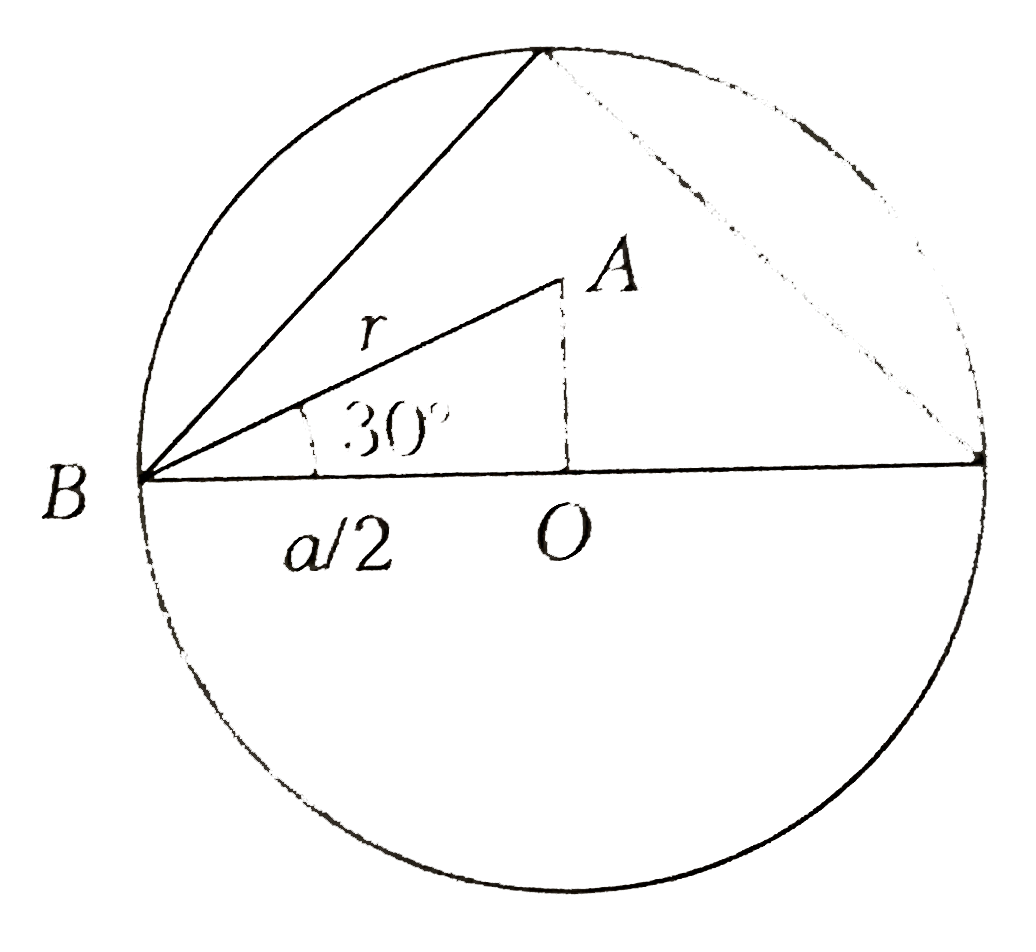Three point masses each of mass m rotate in a circle of radius r with constant angular velocity ω due to their mutual gravitational attraction. If at any instant, the masses are on the vertices of an equilateral triangle of side a, then the value of ω is
√Gma3
√3Gma3
√Gm3a3
None of these
The correct Answer is:B
In right angled ΔAOB,cos30∘=OBAB
⇒√32=a2r⇒r=a√3
√3(Gmma2)=ma√3.ω2
∴ω=√3Gma3

Topper's Solved these Questions
- BOOK - DC PANDEY ENGLISHCHAPTER - GRAVITATIONEXERCISE - (B) Chapter Exercises31videos
GRAVITATION
- BOOK - DC PANDEY ENGLISHCHAPTER - GRAVITATIONEXERCISE - (C) Chapter Exercises45videos
GRAVITATION
- BOOK - DC PANDEY ENGLISHCHAPTER - GRAVITATIONEXERCISE - Check Point 10.620videos
GRAVITATION
- BOOK - DC PANDEY ENGLISHCHAPTER - GENERAL PHYSICSEXERCISE - INTEGER_TYPE2videos
GENERAL PHYSICS
- BOOK - DC PANDEY ENGLISHCHAPTER - KINEMATICSEXERCISE - INTEGER_TYPE10videos
KINEMATICS
Similar Questions
The gravitational potential energy of a system of three particles of mass m each kept at the vertices of equilateral triangle of side x will be
View Solution_S01_003_Q01.png)
Two particles of equal mass (m) each move in a circle of radius (r) under the action of their mutual gravitational attraction find the speed of each particle.View Solution
Knowledge Check
- Question 1 - Select One
Two particles of equal mass go around a circle of radius R under the action of their mutual gravitational attraction. The speed v of each particle is
A12R√(1Gm)B√(Gm2R)C12√(GmR)D√(4GmR) - Question 2 - Select One
A stone of mass M tied at the end of a string, is moving in a circular of radius R, with a constant angular velocity ω. The work done on the stone, in any half circle I s
AπMR2ω2B2MR2ω2CMR2ω2Dzero
Two particles of equal mass go round a circle of radius R under the action of their mutual gravitational attraction. Find the speed of each particle.
View SolutionFour particles of equal masses M move along a circle of radius R under the action of their mutual gravitational attraction. Find the speed of each particle.
View SolutionTwo massive particles of masses M & m (M>m) are separated by a distance l. They rotate with equal angular velocity under their gravitational attraction. The linear speed of the particle of mass m is
View SolutionFour particles of equal mass are moving round a circle of radius r due to their mutual gravitational attraction . Find the angular velocity of each particle .
View SolutionTwo particles of equal mass m0 are moving round a circle of radius r due to their mutual gravitational interaction. Find the time period of each particle.
View SolutionFour particles, each of mass M and equidistant from each other, move along a circle of radius R under the action of their mutual gravitational attraction. The speed of each particle is:
View Solution

